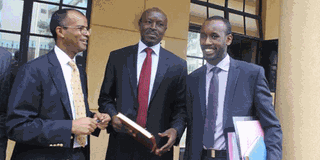Logistics firm withdraws KAA suit at high cost

From left: Lawyers Philip Murgor (Kenya Airways), Mohammed Nyaoga (Kenya Airports Authority) and Ibrahim Adan (Transglobal Cargo Centre) leave the High Court on October 22, 2014. Transglobal Cargo Centre has withdrawn a civil suit against KAA, ending a protracted dispute over a contract for ground handling services at JKIA. PHOTO | PAUL WAWERU |
What you need to know:
- Transglobal also dropped a Sh7 billion compensation claim against KAA for alleged loss of business following delay in awarding it ramp handling services.
- Although the company’s application was allowed, the court left Transglobal with a huge bill after Justice George Odunga ordered it to meet litigation costs of KAA and five rival firms that had joined the suit.
- Transglobal, which is associated with businessman Peter Muthoka, moved to court in 2014 seeking orders to compel KAA to award it a multi-million shilling ground handling contract without subjecting it to competitive bidding as it was already engaged in cargo handling business at the airport.
Logistics firm Transglobal Cargo Centre has withdrawn a civil suit against Kenya Airports Authority (KAA), ending a protracted dispute over a controversial contract for ground handling services at Jomo Kenyatta International Airport, Nairobi.
Transglobal also dropped a Sh7 billion compensation claim against KAA for alleged loss of business following delay in awarding it ramp handling services.
Although the company’s application was allowed, the court left Transglobal with a huge bill after Justice George Odunga ordered it to meet litigation costs of KAA and five rival firms that had joined the suit.
Transglobal, which is associated with businessman Peter Muthoka, moved to court in 2014 seeking orders to compel KAA to award it a multi-million shilling ground handling contract without subjecting it to competitive bidding as it was already engaged in cargo handling business at the airport.
Also, it said it had a mutual business relationship with KAA dating back to 2009.
After the logistics firm filed the case, five companies - Kenya Airways, Kenya Aerotech, Tradewinds Aviation, Eurocraft Agencies and Swissport Kenya - sought to be joined in the dispute, arguing that any court decision would have a bearing on their operations.
CONCESSIONAL AGREEMENTS
The judge allowed the firms to take part in the proceedings as interested parties, saying they already had concessional agreements with KAA to provide ground handling services.
But before the case could proceed to full hearing, Transglobal, on July 31, 2015, filed a notice of its intention to withdraw the suit and asked the judge not to make them pay litigation costs.
But Justice Odunga dismissed the plea on grounds that the interested parties stood to be affected by the case.
The judge said the rival firms were not mere joyriders in the case and that Transglobal had a legal obligation to meet their costs.
“The court cannot compel an applicant to prosecute an application it has no intention of proceeding with. “It (court) can only express its displeasure where appropriate by an award of costs to the respondents,” said Justice Odunga.
The companies, through lawyer Philip Murgor, claimed they had been adversely and unfairly mentioned by Transglobal, without being given an opportunity to respond.
PROCUREMENT LAWS
KAA, in response to Transglobal, argued that the award of tenders to third parties for ground and cargo handling services within the aerodrome were subject to procurement law.
On July 6, 2011, Transglobal applied for an extension of the already operational transit shed licence to include ground handling - whose services include passenger check-in, baggage and flight services.
After the KAA tender committee deliberated on the matter, it notified Transglobal that its request had been approved.
Thereafter, the authority received complaints from other concessionaires over the manner in which Transglobal’s contract had been approved.
But after consultations, KAA concluded that such contracts were to be guided by procurement laws.





